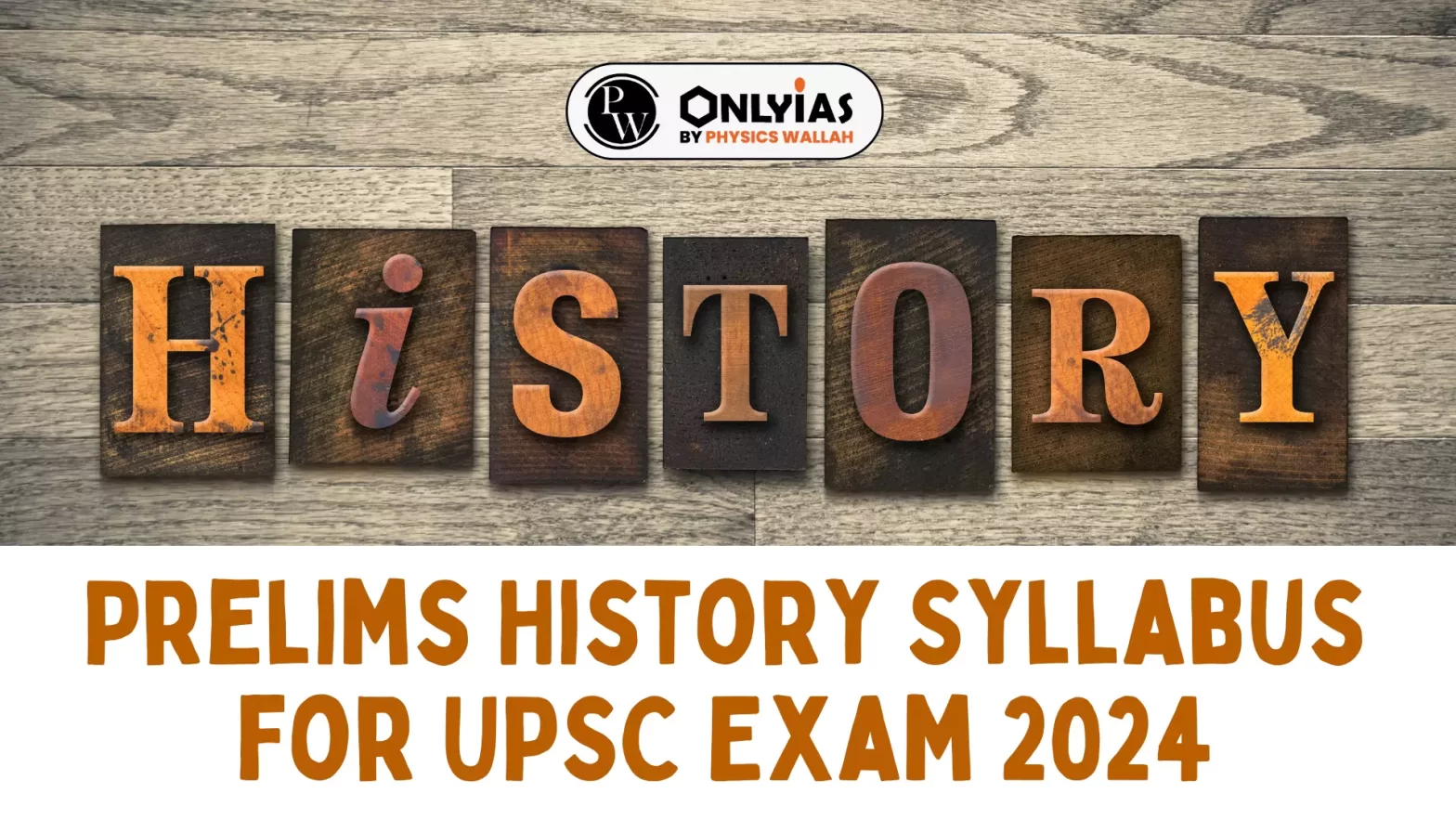Master the UPSC Prelims History syllabus for the 2024 exam with a comprehensive understanding of ancient, medieval, and modern Indian history. Explore the detailed syllabus, recommended booklist, and key FAQs to excel in this crucial subject area.

Prelims History is increasingly becoming trickier, thus making it unpredictable. A comprehensive detail of the prelims History syllabus is provided here. Let’s read the article for more details!
The Union Public Service Commission Preliminary Examination, or UPSC Prelims, is the first stage of the Civil Services Examination conducted by the UPSC. The Prelims consist of two papers: General Studies Paper-I and General Studies Paper-II (CSAT), both of which are objective-type multiple-choice exams.
The detailed UPSC Prelims Syllabus is given in the table below:
| General Studies Paper I | General Studies Paper II (CSAT) |
|
|
The UPSC Prelims History syllabus involves studying Indian history, beginning from Prehistoric times until the Independence period. As part of history, candidates will also have to study Art and Culture during the mentioned period. The detailed syllabus has been provided below:
| Ancient History | Prehistoric Times |
|
| Indus Valley Civilization |
|
|
| Vedic Period and Later Vedic Period |
|
|
| Sangam Period |
|
|
| Jainism |
|
|
| Buddhism |
|
|
| Mahajanapadas |
|
|
| Age of Mauryas |
|
|
| Post Mauryas |
|
|
| Age of Guptas |
|
|
| Vardhana Dynasty |
|
|
| Medieval History | Early Medieval Dynasties |
|
| South Indian Dynasties |
|
|
| Early Muslim Invaders |
|
|
| Sultanate Period |
|
|
| Emergence of Mughals |
|
|
| Consolidation of Power: Akbar’s Rule |
|
|
| Post-Akbar Mughals |
|
|
| Emergence of Marathas |
|
|
| Deccan Sultanate |
|
|
| Vijayanagara Empire |
|
|
| Rise of Regional Kingdoms |
|
|
| Modern History | Advent of Europeans |
|
| British Expansionism |
|
|
| British Administration and Constitution Development of India |
|
|
| Development of Education |
|
|
| Development of Press |
|
|
| Indian Renaissance |
|
|
| Personalities Involved in Indian Social Reforms |
|
|
| Peasant and Tribal Revolts in India |
|
|
| Post Congress Era |
|
|
| 1st Phase of Indian National Movement |
|
|
| 2nd Phase of Indian National Movement |
|
|
| Final Phase of Indian National Movement |
|
|
| Governor Generals of India |
|
Candidates preparing for prelims have to choose books that completely cover the UPSC prelims History syllabus. The syllabus is completely static and hence regular revision is of utmost importance. The complete booklist of History syllabus is given below:
| Book Type | Book Name |
| NCERT |
|
| Reference Books |
|
| Other Sources | Newspapers such as The Hindu and The Indian Express |
In recent years, UPSC prelims History syllabus has gained significant weightage. The questions are mainly factual, which requires basic understanding of ecology and environment. The detailed weightage of History questions is given below:
| Year of Preliminary Examination | Number of History Questions |
| 2023 | 14 |
| 2022 | 14 |
| 2021 | 20 |
| 2020 | 20 |
| 2019 | 17 |
| 2018 | 22 |
| 2017 | 14 |
| 2016 | 15 |
| 2015 | 18 |
| 2014 | 20 |
As seen above, the UPSC prelims history syllabus is wide and detailed. Candidates are required to complete the syllabus and revise it multiple times. Majority of questions will be factual, and hence a generic idea about the time-period is also necessary.
| Must Read | |
| NCERT Notes For UPSC | UPSC Daily Current Affairs |
| UPSC Blogs | UPSC Daily Editorials |
| Daily Current Affairs Quiz | Daily Main Answer Writing |
| UPSC Mains Previous Year Papers | UPSC Test Series 2024 |
No. Most of the questions require a basic idea about the chronology. Remembering all dates will be tedious and unnecessary.
Yes. Solving PYQs will help candidates identify the themes that are repeated multiple times in the exam.
No. Questions are not directly repeated in exams. However, themes and options are often repeated.
NCERT books are the best sources for UPSC Prelims History Syllabus. In addition, standard books mentioned above can also be read.
Initially, modern history had higher weightage in exams. Since the last couple of years, the weightage has shifted towards ancient and medieval history.
<div class="new-fform">
</div>